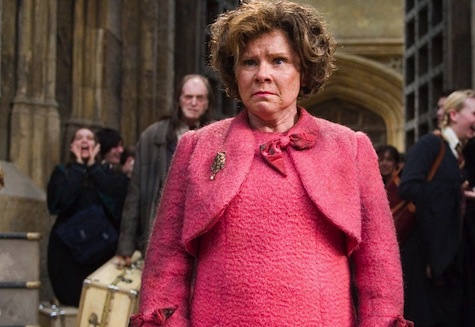Rowling delivered her Halloween story as promised, giving fans more information on Dolores Umbridge (better known as Harry’s fifth year DADA professor, and one of the worst Headmistresses that Hogwarts has ever had). Here is a breakdown of the reveals contained in the story!
Spoilers ahead.
- Umbridge was the daughter of a wizard father and a muggle mother. Her brother was a Squib, which both Dolores and her father blamed her mother for.
- Dolores also took issue with her father for never being more ambition in the wizarding world. He was basically a janitor at the Ministry.
- When Dolores came to work for the Ministry, she rose quickly through the ranks. Once she reached a high enough position, she paid her father a monthly stipend to disappear and never spoke of her true family again, claiming that she was a pure-blood whose dead father was a member of the Wizengamot. People tended not to question her because bad things happened when they did.
- Umbridge never managed to secure a husband, though she wanted one to advance her career; she put people off with her vile rhetoric.
- Her propensity toward pink and frilly accessories only grew as she got older.
- She has phobias of non-human beings.
- She invented her punishment quill, the one she uses on Harry.
- Dolores was put on trial for her crimes after the war, and was convicted, though her punishment is unknown.
Rowling has a few personal notes on the character and the whole piece up on Today.com. (Turns out the character was based on a person she did know, particularly the woman’s like for twee accessories. Yikes.)











Well, there goes years of fanon about the “blood quill”. I still prefer the version which is supposed to be used to sign magical contracts, but it does make sense that this vile deluded monstrous woman might have simply made it up herself.
I’m sure I saw somewhere that she was sentenced to life in Azkaban, but I don’t recall where. I expect that will sort itself out in due time.
From the Wikipedia page : Following Voldemort’s demise, according to Rowling, Umbridge is arrested, interrogated and sentenced to prison for life in Azkaban for crimes against Muggle-borns.
@1 My own personal theory behind Rowling doing these short story releases is she just loves busting fanon theories. I can’t blame her, I know I would in her position.
I thought she was a grocer’s daughter.
I think it is fair to point out that Rowling states the character is loosely based on a few separate people she knew – the person who liked the twee bow wasn’t necessarily as cruel/bigoted as Umbridge was (as far as she knows), although she did know a bigoted kitten plate lover.
It was a little jarring to read about the Muggles that died in Azkaban thanks to Umbridge…I’m glad she does end up getting punishment in due time.
Reading this, one does wonder why she never joined up with Voldemort (I do have a hard time with times…was he perhaps before her time – but she seems the right age). But maybe the appearance of being a law abiding citizen was more important so she was quite happy to let them do the dirty work.
In some ways, she’s a mirror universe version of Percy, or what Percy could have been.
The wizards have a serious problem with record keeping, don’t they?
@@@@@ 4
Mary Cattermole, who we saw Umbridge interrogating, had a father who was a greengrocer. That’s probably what you’re thinking of.
I assumed the “grocer’s daughter” comment was analogizing Umbridge to Margaret Thatcher.
@@.-@: Mafalda Hopkirk’s parents were greengrocers. Umbridge disparages her for that during Mary Cattermole’s trial in the Deathly Hallows book. (Fittingly enough, it is the same scene where we hear her claim descendence from the old Selwyn wizarding family, with the Slytherin locket as “proof”, so it seems her lifetime of pureblood pretense served her well in Voldemort’s regime).
@@.-@,9: Whoops, I made an error. It was Mary Cattermole’s parents who were greengrocers, not Mafalda Hopkirk. But Umbridge still lies about her ancestry.
I’m rather surprised at the number of wizard/muggle marriages that seem to be taking place: so far as I can tell we now know of six (Riddle, Snape, Umbridge, Lupin, Finnigan and ‘Thomas’) (this last in quotes because as I understand it, Thomas was actually the name of Dean’s stepfather, not of either of his biological parents). It looks rather as if JKR thinks of this as the default way of being a half-blood wizard, though the term can also be applied to the child of a pure-blood and a muggle-born wizard, like Dumbledore, Tonks, Harry or the Granger-Weasley offspring.
The books often give the impression of the wizarding and muggle worlds as entirely separated from one another; it’s true that if you look carefully you’ll see there is more interaction than you might at first think (e.g. the Weasley twins showing magic tricks to the girl in the village shop), but all these marriages are still a bit puzzling.